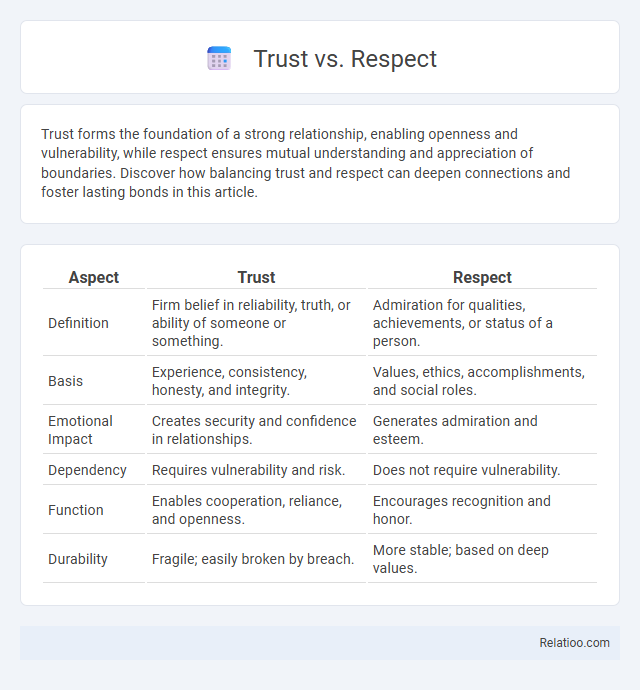Trust forms the foundation of a strong relationship, enabling openness and vulnerability, while respect ensures mutual understanding and appreciation of boundaries. Discover how balancing trust and respect can deepen connections and foster lasting bonds in this article.
Table of Comparison
| Aspect | Trust | Respect |
|---|---|---|
| Definition | Firm belief in reliability, truth, or ability of someone or something. | Admiration for qualities, achievements, or status of a person. |
| Basis | Experience, consistency, honesty, and integrity. | Values, ethics, accomplishments, and social roles. |
| Emotional Impact | Creates security and confidence in relationships. | Generates admiration and esteem. |
| Dependency | Requires vulnerability and risk. | Does not require vulnerability. |
| Function | Enables cooperation, reliance, and openness. | Encourages recognition and honor. |
| Durability | Fragile; easily broken by breach. | More stable; based on deep values. |
Understanding Trust: Foundations and Importance
Trust is established through consistent behavior, honesty, and transparency, forming the foundation for effective relationships in personal and professional settings. Respect develops from recognizing others' abilities and values, while motivation drives individuals to achieve goals, often reinforced by trust in leadership or teams. Understanding trust's importance highlights its role in fostering collaboration, reducing uncertainty, and enhancing commitment across organizations.
Defining Respect: Key Attributes and Value
Respect is defined by acknowledging the inherent worth, rights, and dignity of others, which fosters positive and ethical relationships. It involves active listening, empathy, and honoring diverse perspectives, creating an environment of trust and collaboration. Respect strengthens social bonds and motivation by validating individuals' contributions and encouraging mutual understanding.
Trust vs Respect: Core Differences
Trust centers on the belief in someone's reliability and integrity, while respect is about valuing their qualities, achievements, or status. Your motivation often stems from the level of trust and respect you perceive in relationships or leadership. Understanding these core differences helps improve communication and personal dynamics.
Building Trust in Relationships
Building trust in relationships requires consistent honesty, transparency, and reliability to create a solid foundation. Trust fosters open communication and emotional safety, which enhances mutual respect and deepens connection. Strong trust increases motivation by encouraging collaboration and support, driving shared goals and sustained commitment.
Cultivating Respect in Communication
Cultivating respect in communication builds a foundation where trust naturally flourishes, enhancing motivation within teams and relationships. Your ability to listen actively and acknowledge others' perspectives fosters a respectful environment that encourages open dialogue and collaboration. Prioritizing respect elevates mutual understanding and drives sustained motivation by creating a supportive atmosphere where everyone feels valued.
Can You Have Trust Without Respect?
Trust and respect serve distinct roles in relationships, with trust hinging on reliability and confidence in someone's actions, while respect arises from valuing their character or abilities. It is possible to have trust without respect when one believes in another's competence or honesty but does not admire or value their principles or behavior. However, the absence of respect can weaken the depth of trust, making relationships more transactional and less meaningful.
Can You Have Respect Without Trust?
Respect without trust can exist in relationships where admiration is based on someone's skills, reputation, or authority rather than personal integrity or reliability. Trust involves confidence in someone's honesty and consistency, which deepens respect by adding emotional security and predictability. Motivation to build stronger connections often depends on the interplay between trust and respect, as trust fosters openness while respect encourages valuing others' perspectives.
The Role of Trust and Respect in Leadership
Trust and respect form the foundation of effective leadership, directly influencing team motivation and performance. When leaders demonstrate trustworthiness and respect for their team, they foster a positive work environment that encourages collaboration and innovation. Your ability to build and maintain these qualities can significantly enhance motivation, driving your team's commitment and success.
Trust and Respect in Conflict Resolution
Trust forms the foundation for effective conflict resolution by fostering open communication and reducing defensiveness, while respect ensures that all parties feel valued and heard, promoting collaboration rather than confrontation. You build trust by demonstrating reliability and transparency, and cultivate respect through active listening and acknowledging differing perspectives. Together, trust and respect create a constructive environment where conflicts can be resolved efficiently and relationships strengthened.
Balancing Trust and Respect for Stronger Connections
Balancing trust and respect is essential for fostering stronger connections, as trust ensures reliability and transparency while respect acknowledges individuality and value. Your relationships grow deeper when trust is complemented by genuine respect, creating a foundation where motivation thrives naturally. Prioritizing both elements encourages open communication and collaboration, leading to lasting personal and professional bonds.

Infographic: Trust vs Respect
 relatioo.com
relatioo.com